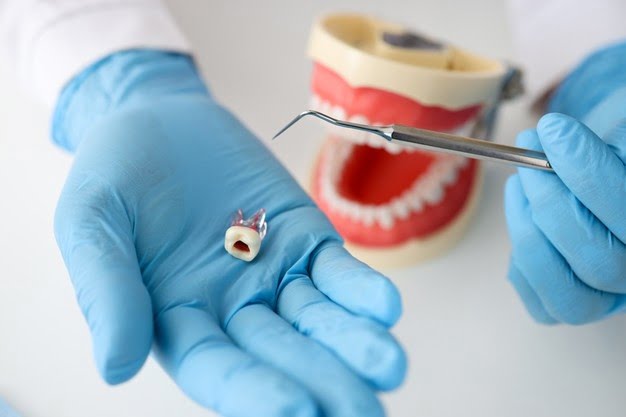Root canal treatment is a common dental procedure to save severely infected or damaged teeth. While the primary focus of this treatment is on oral health, it also has implications for overall health, including conditions like diabetes. Understanding the connection between root canal treatment and diabetes can help patients manage their dental and systemic health more effectively. In this blog, we’ll explore how diabetes affects root canal treatment and vice versa and why it’s essential to consider this relationship for optimal health outcomes.

How Diabetes Affects Dental Health
Diabetes, particularly when poorly managed, can have significant effects on oral health. Here’s how diabetes can impact your dental health and root canal treatment:
Increased Risk of Infection: Diabetes can weaken the immune system, making it harder for the body to fight infections. This increased susceptibility can lead to more frequent and severe dental infections, which may necessitate root canal treatment.
Delayed Healing: Individuals with diabetes often experience slower healing times. This delayed healing can affect recovery after a root canal treatment, potentially leading to complications or longer periods of discomfort.
Gum Disease: Diabetes increases the risk of gum disease (periodontitis), which can contribute to tooth decay and infections. Severe gum disease may lead to situations where root canal treatment becomes necessary to save a tooth that gum issues have compromised.
Dry Mouth: Diabetes can cause dry mouth (xerostomia), which reduces the mouth’s ability to wash away bacteria and food particles. This condition can increase the risk of tooth decay and infection, potentially leading to the need for root canal treatment.
How Root Canal Treatment Impacts Diabetic Patients
For patients with diabetes, undergoing root canal treatment can have specific considerations and impacts:
Blood Sugar Control: Stress and infection from a root canal can affect blood sugar levels. Before, during, and after the treatment, diabetic patients must control their blood sugar levels well to maximize recovery and minimize the chance of complications.
Medication Considerations: Some medications used during or after a root canal treatment, such as antibiotics or pain relievers, can interact with diabetes medications. To avoid adverse interactions, you must inform your dentist and healthcare provider about your medications.
Post-Treatment Monitoring: Diabetic patients may need closer monitoring after a root canal treatment to ensure the healing process progresses. Regular follow-up appointments can help identify and address any issues early, reducing the risk of complications.
Preventive Care: Regular dental check-ups and good oral hygiene are essential for diabetic patients. Preventive care helps manage oral health conditions that could otherwise lead to complications requiring root canal treatment.
Managing Root Canal Treatment with Diabetes
If you have diabetes and need a root canal treatment, there are several steps you can take to ensure a successful outcome:
Inform Your Dentist: Let your dentist know about your diabetes and any other health conditions you have. This information allows them to tailor the treatment plan to your needs and manage potential complications. Choosing the right dental clinic can be tough. If you’re in Karad, Chintamani Dental Home offers expert root canal treatment in Karad, providing effective care for all your dental needs.
Manage Blood Sugar Levels: Work with your healthcare provider to control your blood sugar levels, especially before and after the procedure. Good blood sugar management helps facilitate better healing and reduces the risk of infection.
Follow Post-Treatment Instructions: Adhere to all post-treatment care instructions provided by your dentist. This includes taking prescribed medications as directed, maintaining good oral hygiene, and attending follow-up appointments.
Monitor for Complications: Watch for any signs of complications, such as prolonged pain, swelling, or changes in your overall health. If you notice any unusual symptoms, contact your dentist promptly.
Maintain Regular Dental Visits: Regular dental check-ups are crucial for diabetic patients to prevent and manage oral health issues. Consistent care helps detect potential problems early and ensures that your teeth and gums remain healthy.
Conclusion
The connection between root canal treatment and diabetes highlights the importance of managing dental and systemic health. Diabetes can impact oral health and the effectiveness of dental treatments, while root canal treatment requires careful consideration and management in diabetic patients. By understanding this relationship and taking proactive steps, individuals with diabetes can improve their dental health outcomes and overall well-being. If you have diabetes and are considering or undergoing a root canal treatment, consult with your dentist and healthcare provider to ensure a comprehensive approach to your health care.